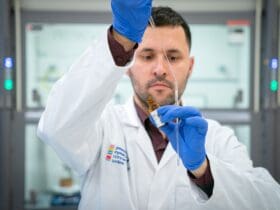A group of GP practices in Swansea have been encouraging patients to help spot the early signs of potential cancer.
Practices within the Llwchwr Local Cluster Collaborative (LCC) have been running a pilot project by getting in touch with patients who haven’t responded to letters inviting them to undertake bowel screening.
Practice staff will send letters to patients to remind them of the importance of being screened and to encourage them to take part.
Screening is a process which checks for signs of cancer in people who don’t have any symptoms.
A home test kit is sent to eligible patients aged between 60 and 74 to help identify the symptoms of bowel cancer.
Patients can then be offered further tests and appropriate treatment if it is necessary.
The project began at Ty’r Felin Surgery, in Gorseinon, but now all practices in the Llwchwr LCC also take part.
Dr James Kerrigan, the Llwchwr LCC lead and GP partner at Ty’r Felin Surgery, said: “It came to our attention around two or three years ago as we were receiving a lot of letters from Bowel Screening Wales to say ‘this person hasn’t responded to their invite’.
“We thought about all of the people who weren’t responding and decided we should write to them to remind them of the importance of screening and to raise awareness of the simplicity of the process.
“Our hope was that a letter from a patient’s own practice, including the names of GPs that they know well and trust, would help validate the process.
“Our practice initially undertook a trial run and we aimed to increase the overall uptake by 10 per cent.
“We then got the other practices in the LCC involved.
“We were of the mind-set that if several hundred people sent their samples back and we picked up just one case of early bowel cancer then it was worth doing.”
In the last few years since the project has been in place, the LCC has seen more patients responding to their screening invitations as a result.
Screening can help find bowel cancer at an early stage, when it’s easier to treat.
“An early detection of cancer is great,” Dr Kerrigan added.
“Some people can be put off from participating as they perceive that the practicality isn’t very pleasant and may not know what to do with it.
“I think it’s fear of the unknown in some cases.
“Even if a test is negative, which is great as we don’t want them to be positive, it might then encourage that person to tell other people that it wasn’t that bad an experience.
“It’s not as gruesome as people think it’s going to be and if screening ultimately saves a life then it’s worth it.”
The symptoms of bowel cancer include a persistent change in bowel habit, blood in the poo, unexplained weight loss, abdominal pain/discomfort or bloating, which may be related to eating.
Dr Kerrigan explained that screening can help to identify cancer in people who may not even have any symptoms.
He said: “People may think if they are going to get bowel cancer then they will have obvious symptoms, such as being in pain or experiencing bleeding.
“Sometimes you don’t necessarily get all or any of the symptoms.
“If the screening picks the cancer up before people have actual symptoms then they have a much better chance of a better outcome.
“Sometimes people don’t fit the rules so this is where bowel screening might pick up somebody who does not have the typical symptoms.”
The project has now been identified as a priority goal for all of the other seven LCCs, to help to improve the early diagnosis of cancer among patients across Swansea Bay.









Leave a Reply
View Comments